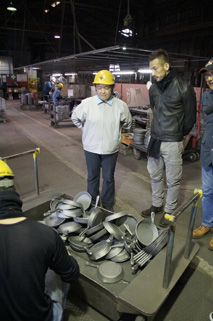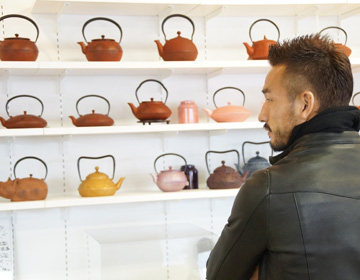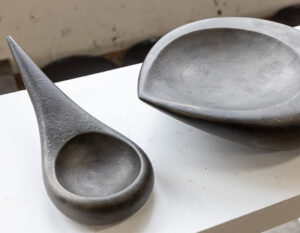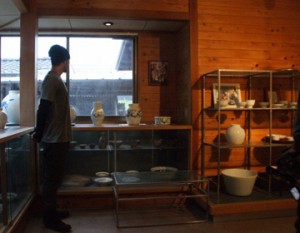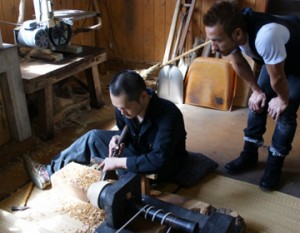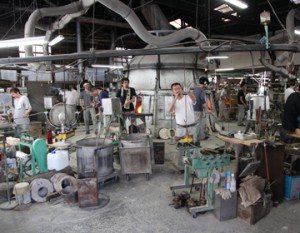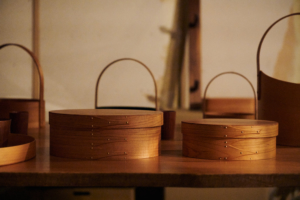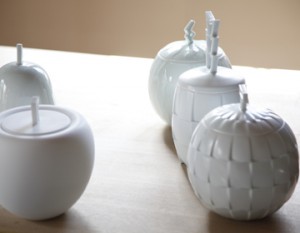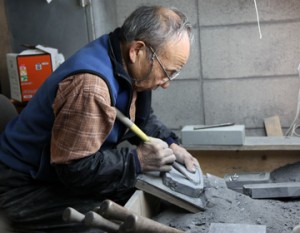Traditional “kogei” from Iwate, Nambu Ironware
Oigen Chozo is where they make iron ware that is designed by Hirose, a metal molding artist whom we visited. It was established in 1852, more than 160 years ago.
There is a theory that the history of Nambu Tetsu started around the period of Oshu Fujiwara. So that goes back 900 years from now. It is said that they brought the casting artist from Konoekoku, currently Shiga prefecture. After the downfall of Oshu Fujisawa the industry also declined, but during the beginning of Muromachi period it started to revive and casting was established as a regional product during the Edo period. After that, it boosted production of mainly iron pots and Buddhist equipment under the protection of the Sendai Date Clan. Oigen Chozo was established during this period.
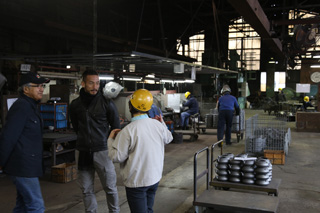
The thinness created by Japanese technique and “sand”
There are techniques around the world using iron as a material for creating pots by casting. But the director, Kuniko Oikawa proudly told us that ”the Japanese technique is the best.” It is because Japanese ironware can be made really thin. The sand used for casting is extremely fine.
”Many people ask us how can we get the surface pattern so fine like this. It is due to the sand. There is no where else in the world where they can make iron kettles so thin with a beautiful surface as ours. To be honest, I don’t think anyone can compete with us when it comes to iron kettles and teapots.” said Oikawa laughing. It is true that the iron pot and enamel pot from abroad is thick and heavy. Compared to that, the iron ware that is in front of us is unconventional. It gives you the impression of elegance.
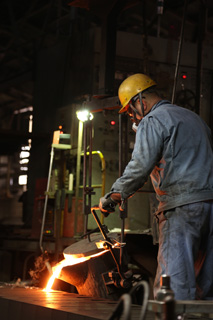
Bread maker is also popular
Nambu iron brings up images of old style pots. Also popular is the iron kettle. In fact, pots and tea kettles are their top sellers. Also popular are the pots and ironware that have a modern feel designed by Hirose.
But there is another very popular item at Oigen Chozo, and that is the bread maker. It is based on the bread maker that Oikawa’s grandmother uses. Compared to stainless steel bread makers, the heat is evenly distributed, and the bread bakes up more delicious.
To continue the tradition of Nambu ironware
Oigen Chozo creates various items that are well suited to modern lifestyle, even though they are located in an area where Nambu iron has more than 900 years of history. Because of this, they pay careful attention to passing on tradition. Skills cannot be maintained if they aren’t being used. They challenge intricate and complicated designs to keep up their skills.
One of the biggest challenges is developing successors. It is important to establish awareness through branding, but having artisans who can make the products comes first. As they carry on traditions, they also make effort to nurture those who will continue to be involved in creating Nambu iron ware.
